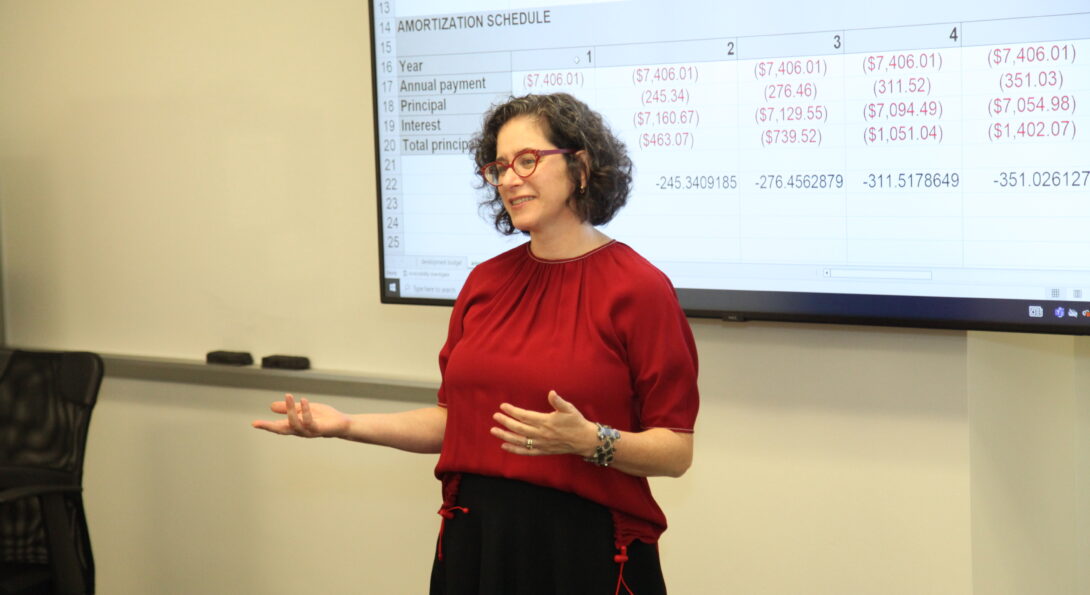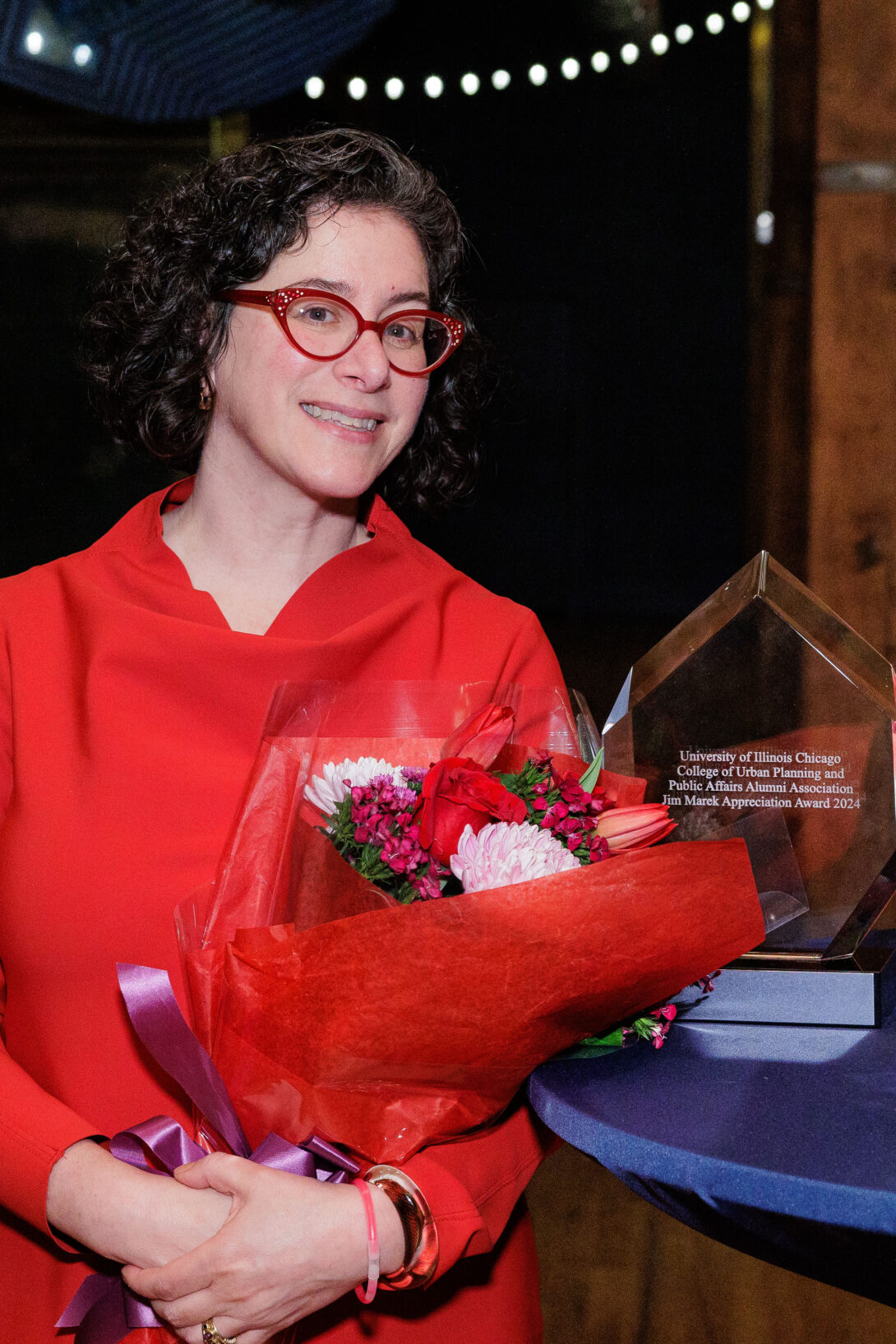UPP Prof Committed to Engagement and Progressive Planning Receives Alumni Association’s Marek Award

Weber Receives Marek Award Heading link

By the time Rachel Weber arrived at the University of Illinois Chicago (UIC) Department of Urban Planning and Policy (UPP) in 1998, Chicago’s once-thriving manufacturing sector was limping along. Beset by cost-cutting moves to overseas facilities, countless factories that had employed a large percentage of the city’s population just a generation prior were now hollowed out, even as they’d received generous government tax incentives to keep jobs in the area. Weber entered the scene as an idealistic, motivated graduate student, still finalizing her dissertation at Cornell. She launched headlong into her work within UIC’s College of Urban Planning and Public Affairs (CUPPA) that houses the Urban Planning and Policy Department. Weber’s interest at the time was how city governments, unions, and non-profits could slow the factory closures and preserve as many jobs as possible.
Already as a graduate student, Weber was well-aware of UPP’s tremendous influence when it came to issues around government subsidies, the closure of manufacturing companies, and the devastating economic toll that often hit these communities once the factories shut down. She’d experienced that toll firsthand while growing up in southeastern Connecticut; with the end of the Cold War in the early 1990s came the shuttering of countless defense industry plants in New England, overnight transformations that wracked local economies and the lives of untold numbers of people. The Center for Urban Economic Development (CUED), founded in 1978, had emphasized this area of research for the previous two decades, tracking the gradual shift of these blue-collar jobs to other part of the United States and to other countries. So when the opportunity to join the UPP faculty and CUED popped up while in graduate school, Weber knew she needed to take advantage.
“I was excited, because there had been strong linkages between Cornell and UIC, and faculty from UIC had come to Cornell when I was a grad student,” Weber says. “They modeled the community-engaged, policy-engaged scholar, and the progressive wing of the planning field that I was interested in, and even though I wasn’t really ready to go on the job market, I submitted an application. I thought it was a long shot.”
For those who have worked alongside Weber in her time at CUPPA, they know the titanic impact she’s had within the college, where her various roles as a researcher, instructor, administrator, and collaborator have revealed her unfailing commitment to the many facets of progressive planning. It’s no surprise then that Weber is being recognized with the Jim Marek Alumni Association Appreciation Award for her dedication to the college, a culmination of years of service.
“As a professor of Urban Planning and Policy and former director of graduate studies, Rachel has made significant contributions to the development of students and alumni,” the alumni association said in its award announcement. “Rachel is an outstanding scholar in the field of urban planning, and she has dedicated herself to improving the policy and planning environments that make communities equitable.”
As an instructor, Weber has become well-known for teaching the graduate-level UPP Development Finance class, a course that students have widely described as intense and demanding but highly rewarding.
For Nicholas Zettel, who now works as the policy director in First Ward Alderman (and fellow CUPPA alum) Daniel La Spata’s office, Weber’s influence is incalculable, both personally and on several generations of Chicago urban planners. Zettel notes that Weber’s commitment to field work has created some full-circle moments, like when Weber worked with students to explore the redevelopment of a former CVS lot in the 1st Ward. Her teaching continues to shape Zettel’s perspective on a changing Chicago and gives him a grounded sense of optimism that better ways of running our cities remain possible.
“Rachel’s work is a great development manual for us to think critically about what Chicago needs and how we can actually build an inclusive economy,” Zettel says. “One of the best things about her class was that it showed that it’s not just wide-eyed optimism to say that we can house everyone and take care of them.”
According to UPP Professor and CUED Director Nik Theodore, the work she’s completed on Tax Increment Financing (TIF) districts and other modes of financialization of the city’s future have proven prophetic. Writing two decades ago about the rise of TIFs, then a little-used tool but in time becoming one of the most controversial modes of speculative planning, Theodore says Weber saw where city planning was going. For a tool that fundamentally changes how the future of cities might unfold, in many cases making it hard for good planning to get ahead of speculative megadevelopment projects, Weber’s work has proven vital to reopening these questions, carving out a distinct subfield whose relevance has only become more obvious with time.
“When Rachel began doing work on TIF, she really was one of the very few within urban planning that not only were working on this, but was even aware of these financial instruments,” Theodore says. “Her work reinforces the importance of scrutinizing those kinds of deals, because they obviously have long-run impacts on development in cities.”
For Weber, CUPPA’s impact on her career is unmistakable, something that made itself known as soon as she arrived and began work on the factory closures: rather than treating public engagement as a happy add-on, she knew it would be core to her work in the college.
“At UIC, there was this attitude of not just putting up with your engagement, but encouraging it,” Weber says. “A lot of schools will be like, ‘Okay, you mainly have to do the scholarship, and if you do this other sort of activism, that’s cool, as long as you don’t neglect your scholarship.’ Nobody ever sat me down and told me this, but I think the expectation here was that you do both, and you do both well.”
This year’s Jim Marek Alumni Appreciation award was presented to Weber at the department’s 50th anniversary celebration on April 10, 2024.
Since 2004, the CUPPA Alumni Association has presented the Jim Marek Alumni Appreciation Award recognizing individuals for their dedication to the fields of urban planning and public administration and their contributions to the development of UIC’s College of Urban Planning and Public Affairs students and alumni.